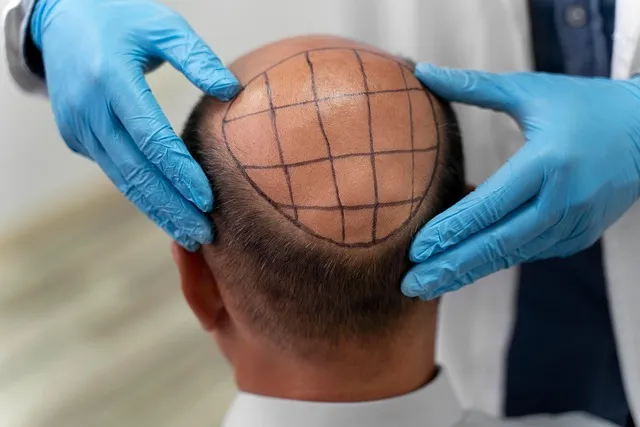You may be wondering how fast does hair grow? However, some of us always need more time to get an answer. Many of us desire long, strong hair that begins to grow as soon as we make that decision. Others are just looking for anything to speed up the growth of their hair so they can trim the inches of damaged ends that have grown in due to years of coloring and heat styling.
Whatever your hair objectives, understanding the stages of hair growth can help you choose the most effective methods for improving the condition of your hair. Let's examine the science behind hair growth and discover factors that affect hair growth. For more information on how fast hair grows and the numerous elements that affect its growth rate, continue reading.

 Each person has unique hair, and various factors can affect how quickly it grows. These consist of the following:
Each person has unique hair, and various factors can affect how quickly it grows. These consist of the following:
A Guide to the Hair Growth Stages -
An estimated 5 million hair follicles are present at birth. These are tiny crevices in the skin where hair can grow. On the scalp, there are about 100,000 of these follicles. People with round follicles have straight hair, while those with oval-shaped follicles have very curly hair. The following are the phases of hair growth:
- Each hair follicle has a hair root consisting of protein-containing cells.
- The protein cells in the body receive the oxygen and nutrients they require to grow as the blood circulates throughout the body.
- Hair is created as the protein cells grow and protrude through the skin.
- The hair passes an oil gland as it emerges from the skin. The oil that the hair requires to keep soft and lustrous is lubricated in this way.
- The hair is dead when it gets long enough to penetrate the epidermis. The dead hair is forced out of the skin while new hair pushes its way up from below. The hair then sheds or falls out.
How fast does hair grow?
According to The Trichological Society, average hair typically grows between 0.5 and 1.7 centimeters per month. This corresponds to between 0.2 and 0.7 inches. However, a wide range of diverse factors influences how quickly hair grows. For instance, men could notice that their hair develops more quickly than women's. The speed of hair development can also be influenced by genetics, age, health, and pregnancy. The only part of the body that develops quicker than hair is bone marrow, the soft material found inside the bones. The only bodily parts without hair are the lips, hand and foot soles, and palms of the hands. The major functions of hair are to keep the body warm and protected.Factors that may affect hair growth -
 Each person has unique hair, and various factors can affect how quickly it grows. These consist of the following:
Each person has unique hair, and various factors can affect how quickly it grows. These consist of the following:
- Genetics: An individual's genetic makeup will determine how quickly their hair grows.
- Sex: Typically, men have a faster hair growth rate as compared to women
- Age: Between the ages of 15 and 30, hair grows most quickly before slowing down. As people age, some follicles completely stop producing hair. Due to this, some people have hair loss or hair thinning.
- Nutrition: A balanced diet is crucial for developing and keeping healthy hair.
Hair loss due to Telogen effluvium disorder -
When stress causes the hair roots to prematurely enter the telogen stage of the hair cycle, it results in telogen effluvium. It could indicate that up to 70% of scalp hairs fall off in two months. Hair frequently sheds in handfuls for those who have telogen effluvium. Although it can affect any body part, the scalp is typically where it is most evident. Know more about Stress and Hair Loss: Is There a Connection? The following are typical telogen effluvium causes:- pregnancy
- high fever
- serious infection
- serious illness
- surgery
- a thyroid gland that is too active or too inactive
- consuming insufficient protein
- retinoids
- beta-blockers
- Calcium channel blockers
- Antidepressants
- ibuprofen, a common nonsteroidal anti-inflammatory medication.
How Can you speed up hair growth?
There is minimal proof, according to The Trichological Society, that using specialized shampoos or consuming supplements helps hasten hair growth. An essential component of healthy hair development is a good diet. This is so because the blood provides nutrition to the live portion of the hair, the root. Healthy hair can be encouraged by consuming a diet rich in fruit, vegetables, grains, and a suitable quantity of fat. Particular food items that can support hair growth include:- Fish: The vital Omega-3 fatty acids, protein, Vitamin B-12, and iron found in fish help to prevent dry scalp and dull-looking hair.
- Dark green vegetables are rich in vitamins A and C, which help maintain healthy hair.
- Protein-rich legumes: This helps prevent thin, brittle hair by promoting hair development.
- Biotin: Hair loss or brittle hair can result from a biotin deficiency. Biotin is found in whole grains, yeast, egg yolk, liver, and soy flour.
- Nuts: These include selenium, a mineral that is vital for a healthy scalp. A few nuts also contain zinc and alpha-linoleic acid. These aid in hair conditioning and reduce shedding.
- Low-fat dairy products: These are excellent sources of calcium, another essential element for hair growth.
Reasons for slow hair growth:
The following factors can cause a slowdown in hair growth:- Unhealthy diets such as a crash diet
- Smoking
- Vitamin shortages
- Eating disorders, for instance, anorexia or bulimia
Final Takeaway:
Each person's pace of hair growth is unique. Various variables, including age, gender, diet, and environmental conditions, can influence the rate of hair growth. Follicles are the small areas inside the skin where hair develops. Each hair follicle contains a hair root composed of protein-cell-based tissue. The roots develop into your hair as the blood vessels provide nutrients. There isn't much research to back the assumption that specialist shampoo or vitamins may speed hair growth. Instead, maintaining a balanced protein-based diet is vital for having healthy hair. Know more about how to pass a hair follicle test in 2 days! Also Read: How do Multivitamins Help in the Growth of Hair and Nails?
Reviewed by







